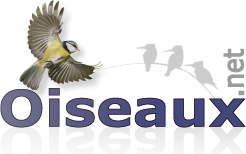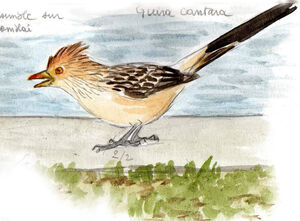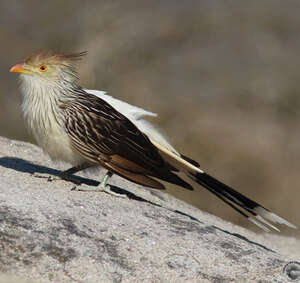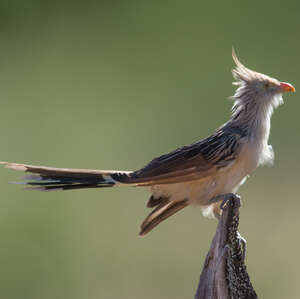Guira Cuckoo
Guira guira - Guira cantara
Identification
The Guira Cuckoo is a New World cuckoo. It measures around 40 cm, with almost half of it being the tail. It weighs between 120-160 grams. There is no sexual dimorphism. The first thing that strikes is the crested head and the long tail. The crown has red tuft feathers that can become erect and form a crest when the bird is agitated. The eye, which ranges from white to orange, is set in a yellow face. The beak is strong, yellow at the base and orange at the end. The upper parts are blackish-brown finely striped with white. When the bird opens its wings or flies away, a large white area is revealed that extends from the back to the tail, invisible when the wings are closed. The lower parts are whitish-brown finely striped with brown at the throat, sides of the neck and chest. The tail, as long as the body, is black and white. It has three bands on the underside, a brown one on the top, a black one in the middle and a white one at the end. The legs are gray. The young have a dark grey beak and a black eye.
Subspecific information monotypic species
Foreign names
- Guira cantara,
- Pirincho,
- ani-branco,
- Guirakuckuck,
- girakakukk,
- Guirakoekoek,
- Cuculo guira,
- guiragök,
- Guiragjøk,
- gvíra podivná,
- guira chocholatá,
- Guira,
- vyökäki,
- guira,
- guira,
- Гуира,
- アマゾンカッコウ,
- 圭拉鹃,
- 圭拉鵑,
Voice song and call
Habitat
Behaviour character trait
It is a social species that is usually found in groups of 3-4, up to a total of fifteen individuals. The Guira Cuckoo loves to warm itself in the sun by spreading its wings and taking dust baths. Due to this habit, the plumage of its lower parts is coloured like the soil. It is afraid of the cold and at night, the birds huddle close to keep each other warm. It can easily die of cold.
Dietfeeding habits
The Guira Cuckoo is largely carnivorous. It mainly consumes insects, crickets, caterpillars, and other arthropods, spiders, myriapods, etc. but it also regularly eats small vertebrates (lizards, frogs, small mammals...). In the absence of its preferred prey, it can also feed on fruits or seeds.
Reproduction nesting
Guira Cuckoos build nests, both individual and collective, and do not lay eggs in the nests of other birds, unlike other Cuculidae. However, females may expel the eggs of other females of the same species from the nest to lay their own. The adults do not always take good care of the eggs and it has been noted that they sometimes abandon a nest with eggs. The offspring leave the nest before they can fly and are still fed by the parents for several weeks.
Geographic range
Threats - protection
Sources of information
- IOC World Bird List (v15.1), Gill, F and D Donsker (Eds). 2025-12-07.
- Handbook of the Birds of the World Vol 16, Josep del Hoyo, Andrew Elliott, David Christie
- A Field Guide to the Birds of Brazil, Ber Van Perlo
- Wiki Aves,
- Birds of the World, The Cornell Lab of Ornithology
Other sources of interest
 Specification sheet created on
30/07/2023 by Dietmar Petrausch
Specification sheet created on
30/07/2023 by Dietmar PetrauschTranslation by AI Oiseaux.net
© 1996-2026 Oiseaux.net
- Accipitriformes
- Aegotheliformes
- Anseriformes
- Apodiformes
- Apterygiformes
- Bucerotiformes
- Caprimulgiformes
- Cariamiformes
- Casuariiformes
- Charadriiformes
- Ciconiiformes
- Coliiformes
- Columbiformes
- Coraciiformes
- Cuculiformes
- Eurypygiformes
- Falconiformes
- Galliformes
- Gaviiformes
- Gruiformes
- Leptosomiformes
- Mesitornithiformes
- Musophagiformes
- Nyctibiiformes
- Opisthocomiformes
- Otidiformes
- Passeriformes
- Pelecaniformes
- Phaethontiformes
- Phoenicopteriformes
- Piciformes
- Podargiformes
- Podicipediformes
- Procellariiformes
- Psittaciformes
- Pterocliformes
- Rheiformes
- Sphenisciformes
- Steatornithiformes
- Strigiformes
- Struthioniformes
- Suliformes
- Tinamiformes
- Trogoniformes





























